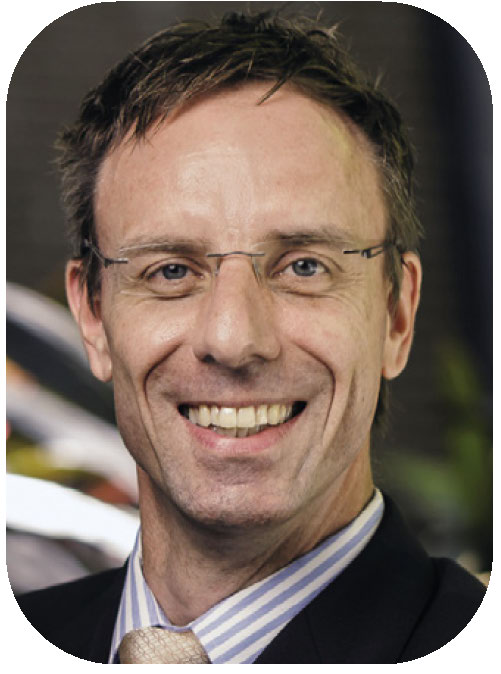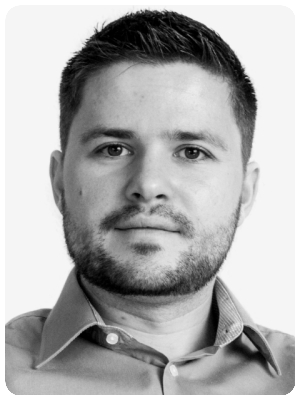Tutorial
| Tutorial 8 | Next Generation SiC/GaN Three-Phase PFC Rectifier / PWM Inverter Systems |
| Date/Time | 24th May, 2021 Monday / 13:00 - 16:00 hrs |
| Speakers | Johann W. Kolar, ETH Zürich Jonas E. Huber, ETH Zürich |
Abstract
This tutorial presents new concepts of future SiC/GaN-based three-phase PFC rectifier and PWM inverter systems, which should feature a wide input/output voltage range, high power density and high efficiency, and low manufacturing costs. First, we explain main loss mechanisms for hard switching SiC power MOSFETs with and without gate-drive-based dv/dt-limitation, and the origin of residual ZVS losses, with a focus on experimental device characterization. Next, we discuss the degrees-of-freedom (DOFs) that facilitate a transition from state-of-the-art two-level converter structures to new converter concepts and operation schemes, considering different functional levels:
(1) Switch level: dv/dt-limitation and advanced switching-frequency-limited ZVS
(2) Bridge-leg level: full/hybrid multi-level topologies and quasi-2-level modulation
(3) Converter level: quasi-single-stage buck-boost current DC-link converter systems
(4) System level: synergetic control of two cascaded converter stages.
Furthermore, we present latest research results of ETH Zurich, i.e. hardware prototypes that implement combinations of the DOFs and a comparison of their performance characteristics against current industrial solutions. Finally, topics of future research in the area will be identified.
Duration
3 hours
Outline
• Application Areas & Key Requirements for Future PFC Rectifier/PWM Inverter Systems
o EV chargers, datacenter power supplies (AC/DC converters)
o Variable speed drives (distributed DC-link DC/AC converters)
• SiC/GaN Characteristics, Performance, Measurement, and Operation
o SiC/GaN devices overview
o Switching behavior / schemes (hard & soft switching)
o Characterizing measurements
o Further characteristics
o Selected results of experimental analyses
• Degrees of Freedom Facilitating New Converter Concepts & Operation Schemes
o Switch level
o Bridge-leg level
o Converter level
o System level
o Remarks on EMI filtering
o Remarks on converter control
• Research Results of ETH Zurich / Implemented New Converter Concepts
o Two-level S-TCM SiC converter (single phase-leg)
o Three-level U-TCM SiC converter (single phase-leg)
o 3x3-interleaved GaN inverter (4.8MHz eff.sw. frequency, single phase-leg)
o Hybrid Active Neutral Point Clamped FCC PV inverter
o Integrated-Active-Filter (IAF) buck-type rectifier
o Buck-type Swiss Rectifier
o Isolated DAB-based matrix-type PFC rectifier
o Vienna Rectifier (DAB isolated, 3/3- and 1/3-mode operation)
o Current DC-link buck-boost PFC rectifier (3/3- and 2/3-mode)
o Buck-boost Y-Inverter
o T-type converter employing monolithic bidirectional GaN switches
• Conclusions
Biography

Johann W. Kolar is a Fellow of the IEEE and is currently a Full Professor and the Head of the Power Electronic Systems Laboratory at the Swiss Federal Institute of Technology (ETH) Zurich. He has proposed numerous novel converter concepts incl. the Vienna Rectifier, the Sparse Matrix Converter and the Swiss Rectifier, has spearheaded the development of xmillion rpm motors, and has pioneered fully automated multi-objective power electronics design procedures. He has supervised 75+ Ph.D. students, has published 900+ journal and conference papers and 4 book chapters, and has filed 200+ patents. He has presented 30+ educational seminars at leading inter-national conferences and has served as IEEE PELS Distinguished Lecturer from 2012 − 2016. He has received 36 IEEE Transactions and Conference Prize Paper Awards, the 2014 IEEE Power Electronics Society R. David Middlebrook Achievement Award, the 2016 IEEE PEMC Council Award, the 2016 IEEE William E. Newell Power Electronics Award, and two ETH Zurich Golden Owl Awards for excellence in teaching. He was elected to the U.S. National Academy of Engineering as an international member in 2021. The focus of his current research is on ultracompact/efficient WBG converter systems, ANN-based design procedures, Solid-State Transformers, ultra-high speed drives, and bearingless motors.

Jonas E. Huber (S’11–M’16) received the MSc (with distinction) degree and the PhD degree from the Swiss Federal Institute of Technology (ETH) Zurich, Switzerland, in 2012 and 2016, respectively. Since 2012, he has been with the Power Electronic Systems Laboratory, ETH Zurich and became a Postdoctoral Researcher, focusing his research interests on the field of solid-state transformers. From 2017, he was with ABB Switzerland Ltd. as an R&D Engineer designing high-power DC-DC converter systems for traction applications, and later with a Swiss utility company as a Business Development Manager. He then returned to the ETH Power Electronic Systems Laboratory as a Senior Researcher in 2020, extending his research scope to all types of WBG-semiconductorbased ultra-compact, ultra-efficient or highly dynamic converter systems. He has published several papers at international conferences and in international peer-reviewed journals, as well as a book chapter. He has co-presented four educational seminars at IEEE conferences.
